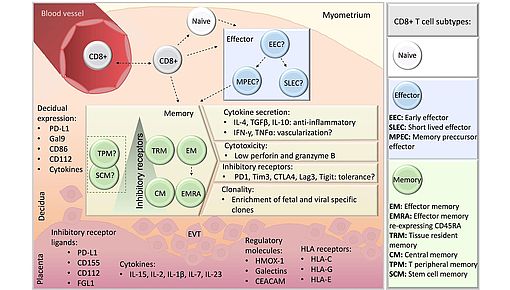
Pregnancy immunology
CD8+ T cells, fetal tolerance and placental vascularization in pregnancy
How embryonic cells evade killing by maternal immune cells is a puzzle that has amazed the scientific community since last century. During gestation, embryo-derived tissues can be considered semi-allograft to the mother, as they carry 50 % of paternal genes, i.e. the ones encoding for major histocompatibility complex (MHC). In the case of organ transplantation, immune recognition of allogeneic MHC proteins e.g. by CD8+ T cells elicit an immune reaction, which mediates tissue damage and rejection. In contrast, in pregnancy certain parental MHC antigenic disparity is not only tolerated but also promotes placental and fetal growth. Fetal development is greatly dependent on placental function, which ensure that the growing fetus is provided with nutrients and oxygen, while deleterious immune responses against the semiallogeneic placental trophoblast are avoided. In our work we aim to unveil the modulation of CD8+ T cells in pregnancy to prevent immune attack which may otherwise hinder placental and fetal development. In particular, we are interested in CD8+ T cells with a regulatory function, that are involved in maintaining the homeostasis of the CD8+ T cell compartment also in the pregnant uterus.
We are happy to welcome you in our team to carry out your master's or doctoral thesis research in the field of human or experimental obstetrics.
News
- Award
Young Investigator Award at the XV World Congress of the International Society for Immunology of Reproduction (ISIR) 2023. Hamburg, Germany
Work: Uterine enrichment of CD8+ T regulatory cells
throughout pregnancy prevents fetal loss in mice
Lilja Hardardottir
- You share our fascination for reproduction?
- We look forward to receiving your application!



